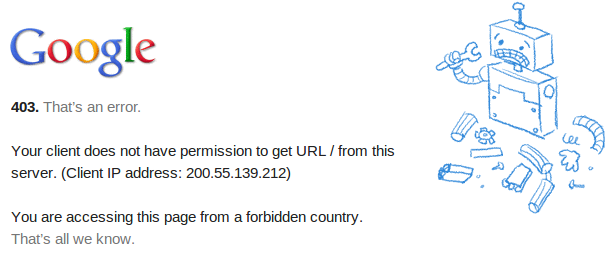There are many reasons to remain anonymous on the Internet. You may live in a country with a restricted, heavily censored Internet service. You may find the prospect of government entities, commercial enterprises and various industries following your every move unnerving. You might simply believe that you are a private citizen, and that that right should be respected.
However, if you're reading this article, you likely understand that without the proper precautions in place, that simply isn't possible in this day and age.
You don't have to remain exposed. You can use an anonymizing proxy server to remain hidden from the numerous prying eyes, granting you a little more security in your own affairs.
What Is An Anonymizing Proxy Server?
When you browse the web, you're broadcasting a pretty constant stream of data. This stream of data can be tracked around the web, and is used for a host of reasons. The vast majority of trackers are for advertising networks, gathering information on you as to serve more interesting and relevant ads. But it isn't always the case. Some news sites track your IP and serve different articles based upon your location and other places you visit online.
An anonymizing proxy server acts as a man-in-the-middle while you are browsing the Internet. It handles the communications between your system and the myriad websites you'll visit, creating an anonymous visitor in their records. Instead of you directly accessing reallyhorrificNSLFcontent.wtf (have a check, it is a genuine TLD), your system sends the request to the anonymizing proxy server, which in turn sends the request to the site. The information is then returned through the server, granting you anonymity.
Why Should You Use An Anonymizing Proxy Server?
Several reasons should persuade you to use an anonymizing proxy server online. Some media outlets would have you believe only those with malicious intent make use of these tools, when in reality, there are numerous legitimate (and in some cases, downright sensible) reasons to want to protect your identity online.
Preventing Identity Theft and Other Security Issues
It seems somewhat obvious, but for identity theft to happen online, the would-be thieves need to know you're there, stepping into whatever scam they have set up. If you approach a website with an anonymous front, they may well be aware that you are there, but there will be no traceable record of your identity. This means no digital paper-trail to piece your vital information together.
Anonymizing servers can also be set up to block any incoming connections from known malicious sources, preventing the installation and communication required for some virus and malware variants to effectively communicate with the control server. This is also effective as we see a consistent rise in malvertising campaigns across extremely popular websites.
As well as this, some users actively encourage their children to use anonymizing services, whether they know it or not. This is to ensure their children's digital activities are not logged, that they're not targeted by specialized adverts, and that their IP address cannot be tracked and translated into a real world address.
Accessing Censored/Restricted Information
I guess this one could be slightly illegal, depending on the information you access. In some cases, the user may be living under a totalitarian regime with heavy restrictions on the countries Internet content. Filters may be applied to both incoming and outgoing data packets, stopping citizens accessing what they choose.
The anonymizing proxy server can mitigate those restrictions, acting as a vital gateway to unrestricted information from the outside world.
Prevent Advertising and Other Profiling
As I previously mentioned, advertising networks will build a profile that follows you around the Internet. They monitor the websites you visit, and the content you view while browsing those sites and offer adverts based upon your previous activity. This ad-profiling has existed for a long time and is in fact part of how the Internet is funded.
However, that doesn't mean you have agreed to the tracking -- but it is difficult to opt-out unless using an anonymous proxy server, or you employ other ways to manage scripts and trackers within a browser.
Anonymous Messaging
Anonymous proxy servers can provide opportunity to use anonymous, encrypted instant messaging services to communicate with other users. Some services actively monitor your conversations, and while we have seen the emergence of end-to-end encrypted services (not anonymous, I must hasten to add) such as WhatsApp, other commonly used messengers, such as Facebook, keep everything you chat about in their giant digital log. These services provide anathema for the tracking and logging.
Despite the widespread conclusion that only evil doers would need an anonymous communication service, a vast array of individuals and organizations also need the additional security:
- Activists
- Whistleblowers
- Journalists
- Business executives
- Scientists
- IT Professionals
- Military
- Law enforcement
To name but a few.
Sensitive Research
As well as anonymous communication, an anonymizing proxy server can be used to conduct anonymous research into extremely sensitive topics. This skirts the realm of criminality, as some of those extremely sensitive topics may indeed be extremely illegal, but we still need information on the applications and potential users of the nefarious services.
Protection From Government Mandated Data Logging
Of course, at the end of the day, a massive aspect of using an anonymizing proxy server is hiding your general Internet activity from those entities we know are actively logging all of our online activities. We constantly hear that this drag-net surveillance is for our own good, and that it is a vital counter-terrorism tool.
This may be true, but it doesn't make me feel any happier that there is a big file where everything is being stored. It may be used for counter-terrorism now, but how about in the future?
I'd rather not find out.
Which Service Should I Use?
Three pretty resolute anonymizing proxy server packages will almost entirely guarantee your online privacy.
Tor
Tor is perhaps the best known browser featuring integrated an anonymizing proxy service. Derided as the tool of terrorists and drug cartels, Tor directs your Internet traffic through a worldwide network of relays, concealing your activity, and making it very difficult for anyone to intercept your communications.
Recently there has been concern regarding the integrity of the Tor network. A number of high-profile arrests have been made, all relating to the various Darknet Markets (black markets operating on the so-called darknet). Many believe the once seemingly impenetrable Tor network has been significantly (and likely, irreversibly) compromised, though some would argue it is still better than using a regular browser and willingly handing over all of your data.
I2P
I2P is a full alternative to Tor, acting as an anonymous overlay network. This "network within a network" has become increasingly popular as trust diminishes in the Tor network.
While I2P offers the same anonymizing service, it works differently to Tor, focusing on providing high-level encryption to all routing, as well utilizing a distributed peer-to-peer model to manage the network, rather than the centralized directory favored by Tor. I2P was built with deep web functionality in mind, but can easily be configured to browse the "surface web."
JonDo
JonDo offer a anonymizing proxy service focused on the "surface web," while the other two services mentioned are designed to also access the deep web. It differs from Tor in that it only uses certified partners as relay nodes, adding an extra level of anonymity. Unlike its counterparts, JonDo offers a premium service to boost the sometimes ridiculously frustrating slow connection speeds, as well as increased security.
Time To Switch?
You might not care about being tracked around the Internet. You might not care that bulk/drag-net surveillance exists, reasoning that it keeps us safe in other ways. But if you do care, and you've slightest feeling of discomfort surrounding your online presence, you should explore an anonymizing proxy service.
It'll keep you safe (or at least, you'll be safer from certain things), you'll be able to make use of fully encrypted and anonymous communications, and most of all, you won't leave the easily traceable digital paper trail swirling in the wind.
What is your preferred service? Do you think Tor is useless, or okay for those simply browsing the web? Let us know below!
Image Credit: walking in by Viorel Sima via Shutterstock


